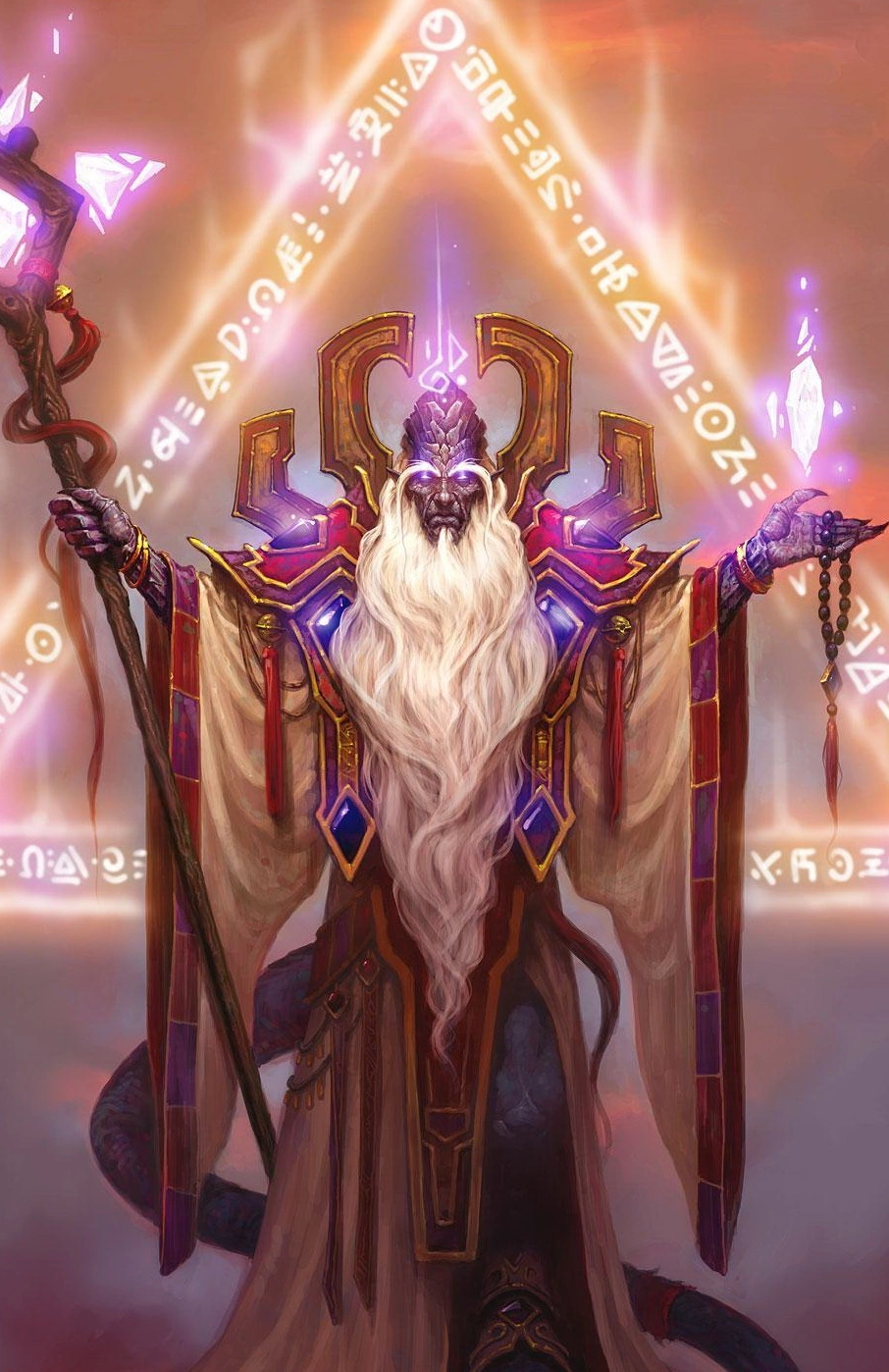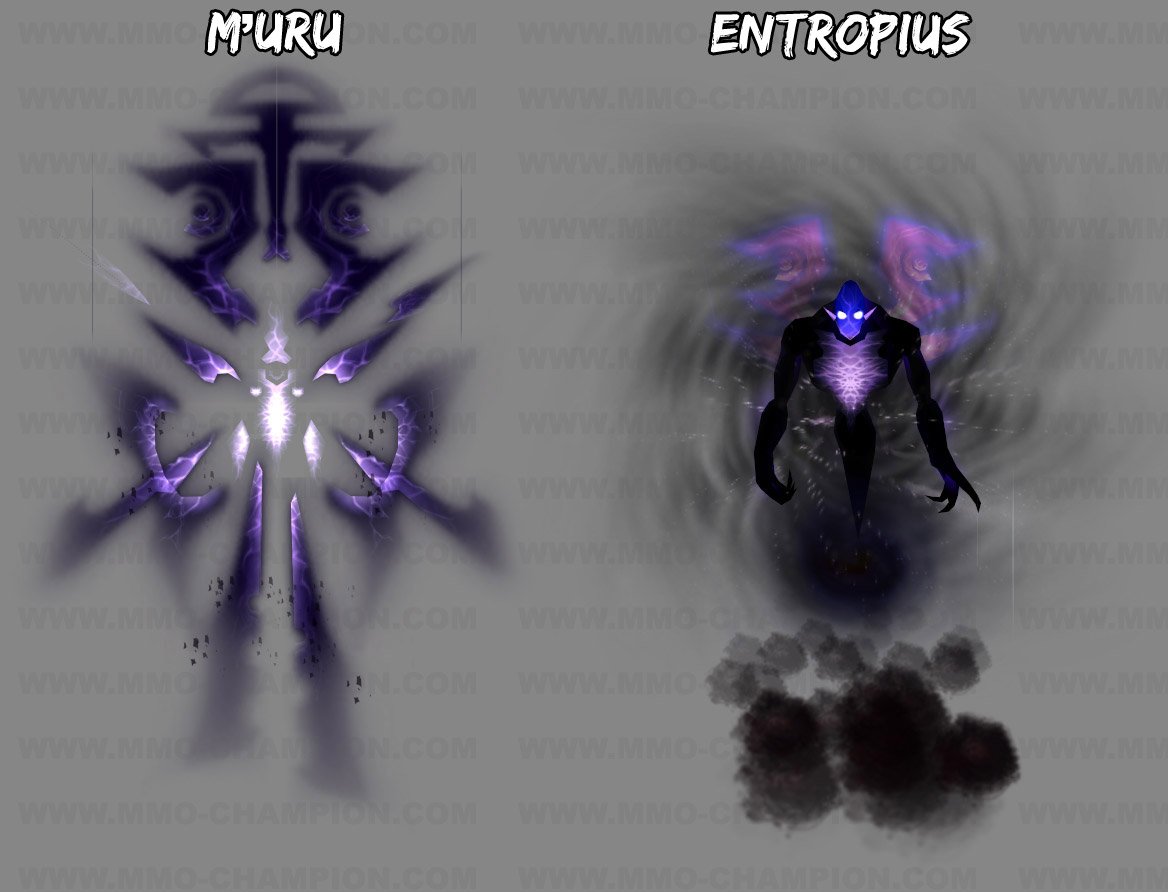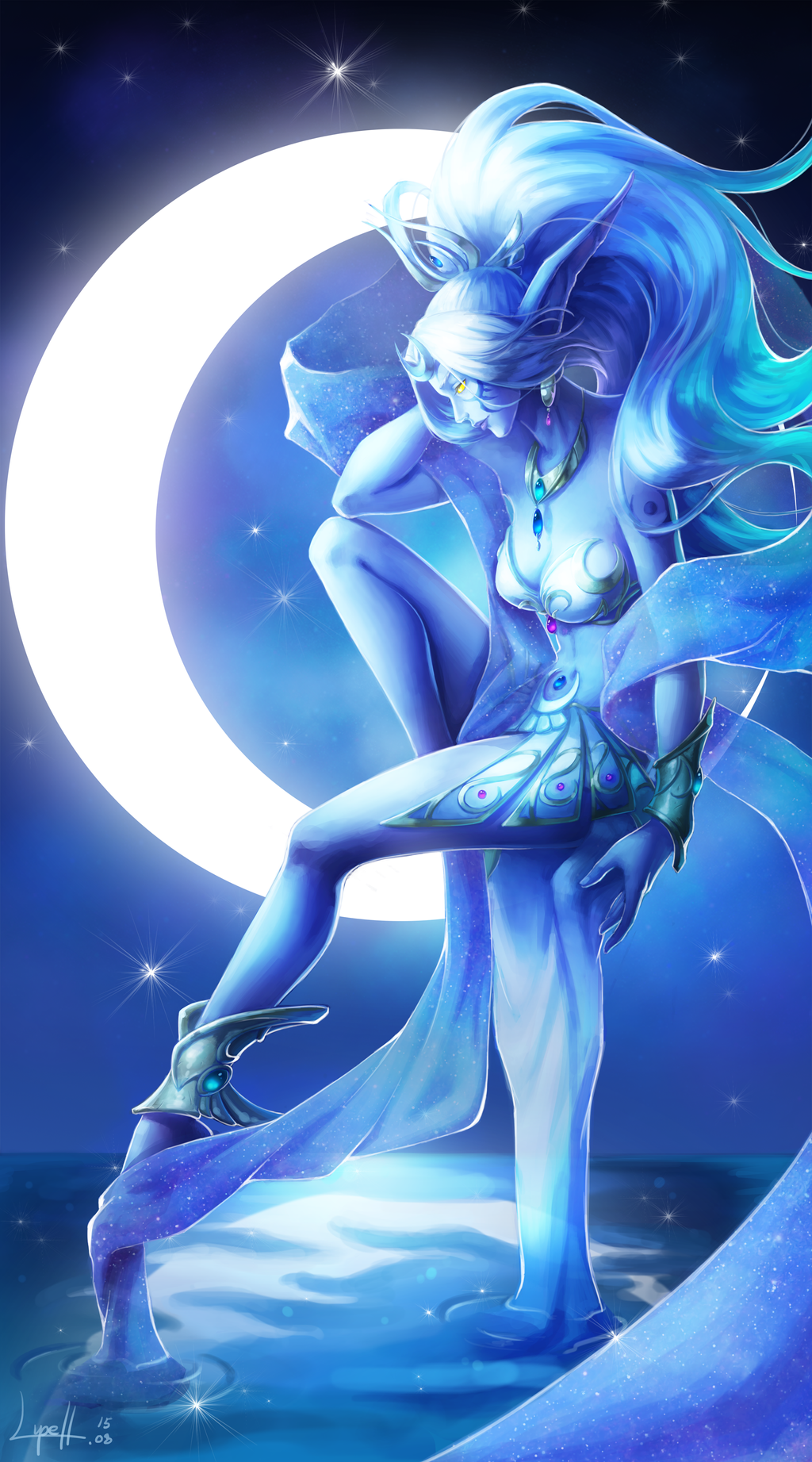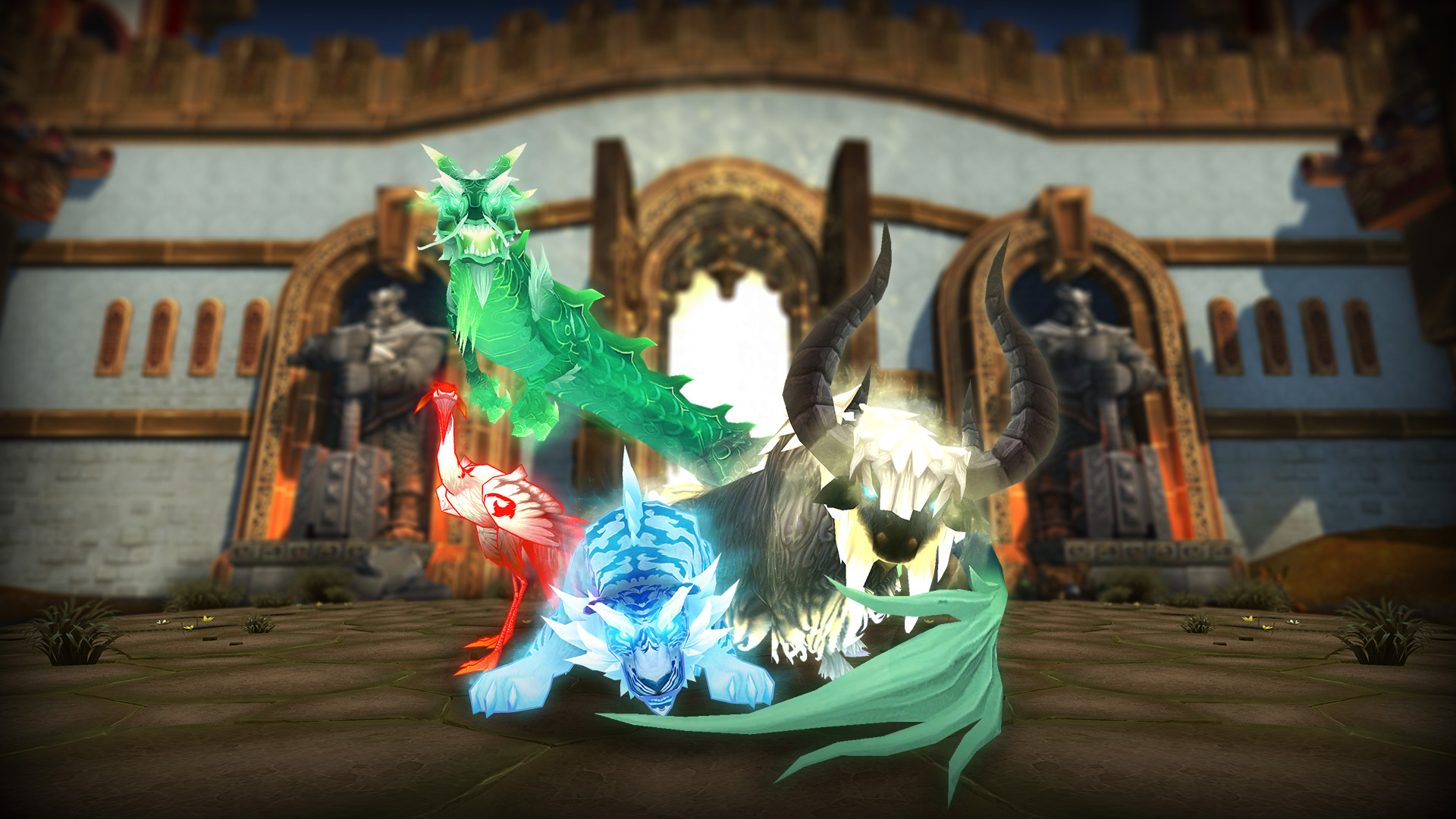The draenei are one of my favorite
races in World of Warcraft. There is an elegance to them, and a
sense of perseverance throughout all of the hardships their species
has faced. I really love their story, and several of my characters
are draenei. Oft times they are referred to as “space goats”, an
accurate moniker.
(For anyone who's interested: This is one of my draenei characters, Velmaara.)
You see, the draenei in WoW are not actually
natives of the planet of Azeroth. They come from another world –
and in order to understand their religion, I need to give a little
bit of a history of the draenei first.
The draenei were originally known as
the eredar, and they dwelt upon the planet Argus. They had a great
civilization there, and they pursued both peace and knowledge. In
time, a being named Sargeras came to the three eredar who led their
people. He offered them additional power, and knowledge of planets
beyond their own, if in return they would open a portal to bring him
to their world.
Unfortunately, Sargeras was not what he
seemed. In fact, he was the leader of the demonic force known as the
Burning Legion. He sought galactic domination and the destruction of
all living things. The eredar, not knowing this, put it to a vote
whether they should accept his offer of aid. Two of them agreed.
The third, the prophet named Velen, was unsure.
An ancient artifact gifted to the
eredar had showed him a vision of great darkness and despair, making
him question the motives of Sargeras. He was unable to convince the
other council members...but through the grace of the naaru Velen was
able to save some of his people.
The naaru were the same beings who had
given the eredar the artifact which granted Velen his vision. They
are some of the oldest beings in the universe. In the beginning
there was only Light and Void. From the Light formed the naaru,
“benevolent creatures composed of scintillating holy energies.”
The naaru swore upon their creation that they would safeguard all
living things in the universe, nurturing the races that they found
and spreading hope through the holy power of the Light.
This task
put them into conflict with the Burning Legion, whose sole goal was
annihilation of all things.
Knowing what Sargeras had planned for the eredar, one of the naaru – a being named K'ure – contacted Velen. He offered to help Velen and any eredar he trusted escape Argus before its doom arrived. Velen agreed, and with the help of the naaru a number of eredar boarded a space ship and fled Argus. From then on Velen and his followers would call themselves the draenei, meaning the “exiled ones.”
The Burning Legion's leader, Sargeras, was infuriated by Velen's escape. He killed or corrupted all eredar who had remained on Argus, turning many of them into demons to flush out his army's ranks. The anger of Sargeras was limitless, and he would continue to track the draenei for thousands of years, determined to kill them for their betrayal.
The
draenei explored many worlds before eventually settling down and
attempting to make their home on a planet called Draenor. Through
all this time the naaru continued to aid and teach the draenei,
including educating them about the Holy Light. The Light is not a
being, and so cannot really be referred to as a god. Rather, it is
something that is everywhere and within everyone, a power of goodness
and righteousness. The draenei worship both the Light and the naaru.
(The
best real-world example I can give for this is found in Christianity.
Imagine if Christians worshiped both God and the angels –
it's as close as I can come to the idea of the Light and the naaru.)
Unfortunately for the draenei, Sargeras eventually found them and sent the Burning Legion to destroy them. A great battle ensued, and the draenei once again attempted to escape via space ship. This ship, the Exodar, crash landed on the planet of Azeroth...adding the draenei to the denizens of the World of Warcraft.
Interestingly enough, the naaru are not incorruptible beings. There are two examples within WoW that I know of where the naaru have, for lack of a better term, “gone dark side.”
The first is K'ara. When the draenei first fled to Draenor, something went terribly wrong with their ship. To protect the draenei, K'ara sacrificed herself. However, the naaru was not killed. Instead, she became infected with shadow. The ancient enemy of the Light is the Void, and the naaru found herself serving that very thing. The orcs who found her named her the Dark Star, and her powers were used in dark necromantic rituals. Eventually K'ara was found by the draenei. To purify her, Velen sacrificed himself. It was enough to cleanse K'ara of the Void and return her to the side of the Light.
The second darkened naaru is M'uru. He was captured by the blood elves, a race with whom the draenei have long been in conflict. The blood elves crave power above all else, and saw in M'uru a source of power. They imprisoned him and siphoned off his energy for their own uses, including summoning a great demon. M'uru gradually became a force of darkness. In the game it is possible to fight him – he's a boss in one of the raids in WoW. When M'uru is defeated a great shadow appears, and he transforms into a terrible demon.
(M'uru and his demonic evolution.)
I'll wrap this up with one last example of the naaru.
One of my favorite story lines in WoW showcases the tenderness and mercy of the naaru. There's a quest chain in a zone called Icecrown that revolves around Crusader Bridenbrad. Bridenbrad was a brave and noble fighter who contracted the plague, which gradually turns one into an undead monster. Not wanting to risk infecting anyone, he went into self-imposed exile far in the snowy wastes of Icecrown and waited to die. A commanding officer sends the player's character to try and find Bridenbrad.
When you find the
Crusader and bring word back to the officer of his condition, you are
sent on a quest to try and find a way to cure him of the plague.
Such a good and noble man cannot be allowed to die. The player is
sent first to the dragon Alexstrasza, the Aspect of Life in Azeroth.
She attempts to cleanse Bridenbrad of the plague, but is unable to
rid him of it entirely. Next you go to a being named Cenarius, a
demigod who is revered by the druids. He too is unable to cure
Bridenbrad of the plague.
At
last you are sent to visit one of the naaru, a being named A'dal.
When you go to him he says that he knows of Bridenbrad already. “The
Light will take care of its own. I will extend my blessing to
Bridenbrad and he shall not endure the corruption of undeath.”
Upon returning to the Crusader, A'dal
and two other naaru appear above him. “Fear not, young one, for
this crusader shall not taste death. In life, Bridenbrad was the
bearer of great deeds. Now, in passing, he shall taste only
paradise. The Light does not abandon its champions.”
As the naaru speaks, Bridenbrad's body
rises into the air. He is taken by the naaru to a better place, and
the plague is defeated.
I do the quest chain on every character
I have. It never fails to bring me to tears. Even more touching is
the fact that Crusader Bridenbrad is actually based on a real person
– one who died from cancer.
The Light – and the naaru – take
care of their own.
What did you guys think?

















